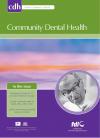Community Dental Health

- Cover Date:
- June 2008
- Print ISSN:
- 0265 539X
- Vol:
- 25
- Issue:
- 2
Individual and maternal determinants of self–reported dental health among Turkish school children aged 10-12 years.
Objective To assess the influence of maternal and individual characteristics on self-reported dental health of Turkish school children aged 10-12 years with different socio-economic backgrounds. Method A cross-sectional study of children aged 10 to 12 (n=611) using paired matches of self-administered questionnaires for children and their mothers. Clinical examinations based on World Health Organization criteria were conduced. The participation rate was 97% (n=591) for the children, 87% (n=533) for the mothers, and 95% (n=584) for the clinical examinations. Multiple linear regression, descriptive statistics, Spearman correlation coefficient and chi-square test were applied. Results Private school children’s mothers were more likely to have had higher education (95% at least high school) than public school children’s mothers (11%); they reported better dental health (above average) than did mothers of public school children (p=0.001). Among all mothers, those with above average self-reported dental health reported more regular dental visits than did those with below average scores (p=0.001). Frequency of regular dental visits and toothbrushing among children attending public schools (5%, 65%) were lower than those attending private school (43%, 79%), (p=0.001). The mean DMFS was negatively correlated with self-reported dental health (rs =-0.187, p=0.001). Toothbrushing frequency and school performance were the common factors positively associated with self-reported dental health, among all children. Conclusion The results emphasize the important role of mothers and their socio-economic background in enhancement of children’s dental health. Their active role in conjunction with the potential of self-assessment provides a good basis for establishing and improving self-care among children, in developing countries in particular.
Key words: Dental health, mothers, oral health behaviour, self-reporting, socio-economic status, children
- Article Price
- £15.00
- Institution Article Price
- £
- Page Start
- 84
- Page End
- 88
- Authors
- A.B. Cinar, N. Kosku, H.N. Sandalli, H. Murtomaa
Articles from this issue
- Title
- Pg. Start
- Pg. End
- Editotial - Do we let children’s teeth decay just because some people object to topping up the natural fluoride that’s already in our water?
- 66
- 69
- Dental caries rates in primary teeth in 2002, and caries surveillance trends 1981-2002, in a South African city.
- 79
- 83
- Individual and maternal determinants of self–reported dental health among Turkish school children aged 10-12 years.
- 84
- 88
- Comparison of ranking dental status using the Significant Caries Index and the Significant Filled and Sound-Teeth Index
- 103
- 106
- Measuring oral health behaviour in Flemish health care workers: an application of the Theory of Planned Behaviour
- 107
- 114
